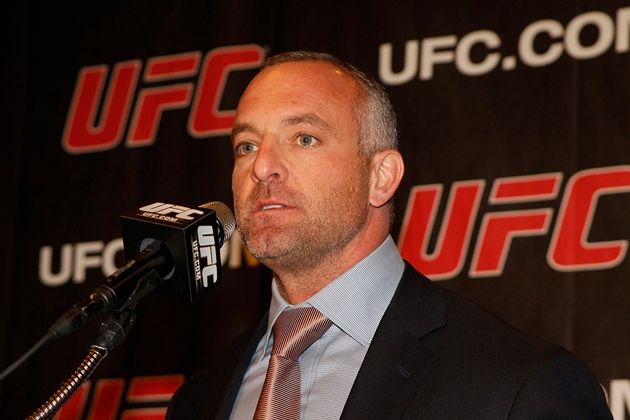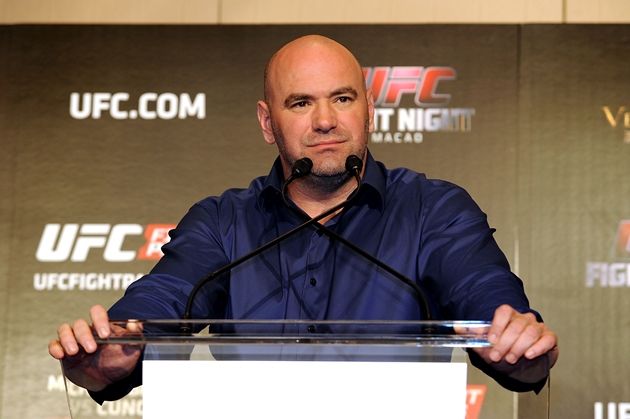

Share
18th February 2015
08:07pm GMT

 “Given the recent spate of high-profile cases, we felt like we needed to do this sooner rather than later,” he said. “For the good of the sport, for the integrity of the sport, for what we’re trying to do here, we needed to address this issue ASAP.”
And Fertitta claimed that the UFC were speaking to third-party agencies such as the World Anti-Doping Agency (WADA) and United States Anti-Doping Agency (USADA) who would be responsible for setting out punitive measures for fighters who fail drug tests.
“You may be not training at all, but someone may show up to take a random sample,” Fertitta said. “We’re talking to these third-party agencies to see how many tests we need to do to be sure we have a clean sample to be sure our athletes are clean."
Fertitta revealed that he felt harsher penalties needed to be in place for athletes who tested positive.
“We certainly advocate for [a two-year ban]. We are committed to it in every way that you possibly could be. There should be no mistake there. This is a call-out to all of the athletes on our roster. You’ll be tested in competition, you’ll be tested out of competition, and if you’re using, you will be caught, and there will be significant penalties that go along with that.”
“Given the recent spate of high-profile cases, we felt like we needed to do this sooner rather than later,” he said. “For the good of the sport, for the integrity of the sport, for what we’re trying to do here, we needed to address this issue ASAP.”
And Fertitta claimed that the UFC were speaking to third-party agencies such as the World Anti-Doping Agency (WADA) and United States Anti-Doping Agency (USADA) who would be responsible for setting out punitive measures for fighters who fail drug tests.
“You may be not training at all, but someone may show up to take a random sample,” Fertitta said. “We’re talking to these third-party agencies to see how many tests we need to do to be sure we have a clean sample to be sure our athletes are clean."
Fertitta revealed that he felt harsher penalties needed to be in place for athletes who tested positive.
“We certainly advocate for [a two-year ban]. We are committed to it in every way that you possibly could be. There should be no mistake there. This is a call-out to all of the athletes on our roster. You’ll be tested in competition, you’ll be tested out of competition, and if you’re using, you will be caught, and there will be significant penalties that go along with that.”
 UFC President Dana White echoed the opinion of Fertitta by claiming that the current, standard nine-month ban for first-time offenders was insufficient due to the fact that that could result in fighters missing just the one fight.
“Fighters are going to look at risk vs reward,” he said. “'If I can make a couple million dollars, I’ll take the risk.' Two or four years could be career threatening. Now you look at the risk vs reward, and it’s a lot more dangerous.”
The UFC press conference came after a series of incidents of high-profile fighters testing positive for performance enhancing drugs.
Anderson Silva provided two positive samples to the NSAC, one in an out-of-competition test on January 9 and another in a post-fight drug test on January 31.
The first test came back with traces of the anabolic steroids Drostanolone and Androstane while the post-fight one showed up Drostanolone, as well as the sleeping medication Oxazepam and anti-anxiety medication Temazepam.
UFC President Dana White echoed the opinion of Fertitta by claiming that the current, standard nine-month ban for first-time offenders was insufficient due to the fact that that could result in fighters missing just the one fight.
“Fighters are going to look at risk vs reward,” he said. “'If I can make a couple million dollars, I’ll take the risk.' Two or four years could be career threatening. Now you look at the risk vs reward, and it’s a lot more dangerous.”
The UFC press conference came after a series of incidents of high-profile fighters testing positive for performance enhancing drugs.
Anderson Silva provided two positive samples to the NSAC, one in an out-of-competition test on January 9 and another in a post-fight drug test on January 31.
The first test came back with traces of the anabolic steroids Drostanolone and Androstane while the post-fight one showed up Drostanolone, as well as the sleeping medication Oxazepam and anti-anxiety medication Temazepam.
 And just last week, a scheduled bout between Rory MacDonald and Hector Lombard was scrapped from UFC 186 after Lombard (35-4-1, 1NC) tested positive for the anabolic steroid Desoxymethyltestosterone in a post-fight drug test after his latest win over Josh Burkman in January.
And Fertitta was adamant that the UFC are going to push commissions so the early revelation of results so that fights cannot take place when a fighter has a performance enhancing drug in his/her system, even if that meant scrapping big-money fights.
“If we lose main events, we lose main events,” Fertitta said. “Joe Silva is going to have to get just a little more creative.”
The UFC are not shying away from the issue and are putting their money where their mouth is. Between 2013 and 2014, they claim to have spent approximately $500,000 in testing expenses but are now willing to increase that amount tenfold if need be to eradicate the issue of PEDs from their organisation.
And just last week, a scheduled bout between Rory MacDonald and Hector Lombard was scrapped from UFC 186 after Lombard (35-4-1, 1NC) tested positive for the anabolic steroid Desoxymethyltestosterone in a post-fight drug test after his latest win over Josh Burkman in January.
And Fertitta was adamant that the UFC are going to push commissions so the early revelation of results so that fights cannot take place when a fighter has a performance enhancing drug in his/her system, even if that meant scrapping big-money fights.
“If we lose main events, we lose main events,” Fertitta said. “Joe Silva is going to have to get just a little more creative.”
The UFC are not shying away from the issue and are putting their money where their mouth is. Between 2013 and 2014, they claim to have spent approximately $500,000 in testing expenses but are now willing to increase that amount tenfold if need be to eradicate the issue of PEDs from their organisation.Explore more on these topics: